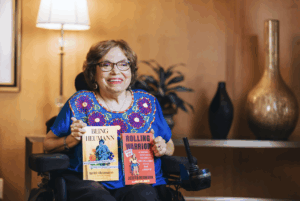All upper division courses used in satisfaction of the Minor Program must be taken for a letter grade, with the exception of Public Health 116, which is a mandatory P/NP course. The student must achieve at least a C average (2.0) in the upper division courses offered in satisfaction of a Minor Program.
Core Courses (2 Courses):
- A. DISSTD 110: Introduction to Disability Studies (formerly UGIS 110)
- B. One course from the list below. Additional coursework from Part B may be used as electives.
- English 175: Literature and Disability
- English 180A: Disability Memoir
- Anthropology 189: Special Topics/Cultural Anthropology: Disability, Ethnography and Design
- City and Regional Planning 120: Community Planning and Public Policy for Disability
- ESPM 149: Bodies, Difference, and the Environment
- English 100 Sem 10: Crip Theory and Crip-of-Color Critique, or How to Read for the Body (Spring 2025)
- DISSTD 112: Women and Disability (formerly UGIS 112)
- Education 53: Neurodiversity: Scholarship, Politics, and Culture* (Fall 2025).
Approved Electives (3 courses)
Anthropology (ANTH)
115: Introduction to Medical Anthropology
189: Special Topics/Cultural Anthropology: Disability, Ethnography, and Design (Fall 2021)
189: Racial Profiling and Cultural Competency in the Time of Pandemics (Summer 2021)**
196: Mental Health in Conflict Zones: The Politics of Trauma on the Border of Israel and Gaza (Fall 2021)**
Architecture (ARCH)
169: Special Topics in Construction Materials (Introduction to ADA and Universal Design)**
Art Practice (ART)
118: Advanced Drawing: Remixing the Figure
160: Special Topics in Visual Studies: Designing and Activating Public Space**
165: Art, Medicine, and Disabilities
Asian American and Asian Diaspora Studies (ASAMST)
143AC: Asian American Health
Chicana/o and Latina/o Studies (CHICANO)
176: Chicanos and Health Care
City and Regional Planning (CY PLAN)
117AC: Urban and Community Health
218: Transportation Planning Studio (Fall 2021)**
Computer Science (COMPSCI)
160: User Interface Design and Development
East Asian Languages and Cultures (EA LANG)
114: Illness Narratives, Vulnerable Bodies
160: Neurodiversity in Literature
Economics (ECON)
157: Health Economics
Education (EDUC)
53: Neurodiversity: Scholarship, Politics, and Culture
188F: Language, Race, and Power in Education
Engineering (ENGIN)
157AC: Engineering, The Environment, and Society
English (ENGLISH)
80K: Children’s Literature (when taught by Charles F.S. Creasy)
135AC: Race, Ethnicity, and Disability in Literature
165: The Visible Made Verbal: Audio Description Across the Arts
180A: Autobiography: Disability Memoir
Environmental Science, Policy, and Management (ESPM)
161A: Thinking With Animals
162: Bioethics and Society
162A: Health, Medicine, Society, and Environment
C167: Environmental Health and Development
254: Ethnic and Cultural Diversity in Health Status
C282: Health Implications of Climate Change
Ethnic Studies (ETH STD)
103C: Deconstructing Race-Based Medicine and Health Inequities (Spring 2022)**
190AC: Inside and Beyond Walls: Migra, Masses, and the Carceral State (Fall 2021)**
Global Studies (GLOBAL)
173: International Human Rights
Gender and Women’s Studies (GWS)
100AC: Women in American Culture (when taught by Barbara Barnes)
111: Special Topics: Disability Justice**
111: Special Topics: Women with Disability in Film and Literature**
129: Bodies and Boundaries
130AC: Gender, Race, Nation, and Health
131: Gender and Science
133AC: Women, Men, and Other Animals: Human Animality in American Cultures
C180Y: Gender, Sex, and Power (Spring 2022)
Art, History of (HISTART)
182: Photography in the 20th Century: Sex, Race, and Medicine
190D: 15th-16th Century: Warburg’s Archives in Berkeley: New Perspectives on Renaissance and Baroque Art (Spring 2022)**
Arts and Humanities (HUM)
196: Mentored Research: Remembering Eugenics at Berkeley and in California (Spring 2022)**
Italian Studies (ITALIAN)
120: Topics in Italian Studies (when the topic is Disability, Difference, and Desire in Italian Fiction and Film)**
Landscape Architecture and Environmental Planning (LD ARCH)
140: Social and Psychological Factors in Open Space Design
Legal Studies (LEGALST)
137: Comparative Equality Law
154: Human Rights, Research and Practice
159: Law & Sexuality
Lesbian, Gay, Bisexual, and Transgender Studies (LGBT)
100: Trans Study**
Letters and Science (LS)
C180Y: Gender, Sex and Power
Linguistics (LINGUIS)
1A: American Sign Language I
1B: American Sign Language II
2A: American Sign Language 3
Media Studies (MEDIAST)
190: Special Topics: Beauty and Fashion in the Popular Culture: A Comparative Study (Fall 2021)**
190: Beauty, Gender and Race in Global Popular Culture**
Public Health (PB HLTH)
116: Seminar on Social, Political, and Ethical Issues in Health and Medicine
126: Health Economics and Public Policy
130: Advanced Health Policy
150D: Introduction to Health Policy and Management
150E: Introduction to Community Health and Human Development
C155: Sociology of Health and Medicine
C160: Environmental Health and Development (Spring 2022)
C202B: Ethnic and Cultural Diversity in Health Status
222A: Health Care Technology Policy
226A: Global Health Economics
C271G: Health Implications of Climate Change
290: Health Issues Seminars: Bioethics from Nuremburg to Modern Times
Public Policy (PUB POL)
101: Introduction to Policy Analysis
Psychology (PSYCH)
131: Developmental Psychology (renamed to: Developmental Psychopathology)
Social Welfare (SOC WEL)
210C: Community Planning and Public Policy for Disability Aging Processes
250L: Human Sexuality
Sociology (SOCIOL)
113AC: Sociology of Education
113: Sociology of Education
C115: Sociology of Health and Medicine
137AC: Environmental Justice: Race, Class, Equity, and the Environment
169: Sociology of Mental Health (Fall 2025)
Disability Studies (DISSTD) [Formerly Undergraduate Interdisciplinary Studies (UGIS)]
112: Women and Disability
113: Disability Studies in Practice
* Subject to approval.
** Contact the academic advisor if course has been completed if you wish to use it to satisfy an elective requirement.





